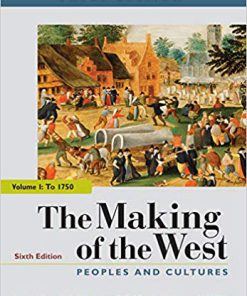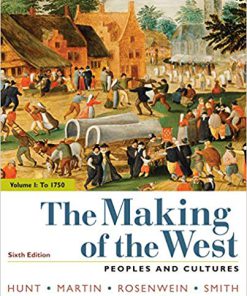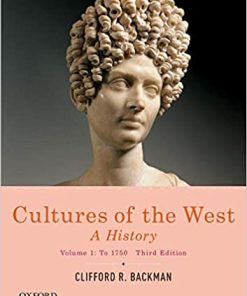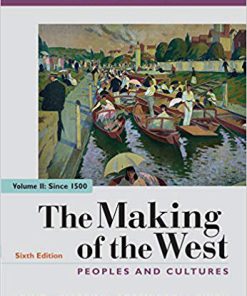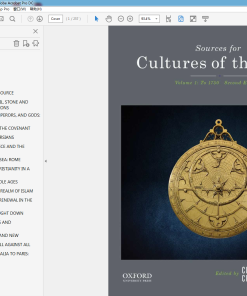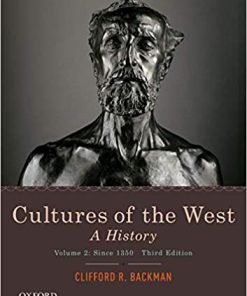(eBook PDF) The Making of the West, Value Edition, Volume 2: Peoples and Cultures 6th Edition
$50.00 Original price was: $50.00.$35.00Current price is: $35.00.
(eBook PDF) The Making of the West, Value Edition, Volume 2: Peoples and Cultures 6th Edition – Instant Download
(eBook PDF) The Making of the West, Value Edition, Volume 2: Peoples and Cultures 6th Edition – Digital Ebook – Instant Delivery Download

- ISBN-10 : 1319103634
- ISBN-13 : 978-1319103637
- Author: Hunt, Lynn, Martin, Thomas R., Rosenwein, Barbara H.
Containing the cross-cultural exchanges that shaped western history, Making of the West, Volume 2: Since 1500 utilizes a global context and chronological narrative to highlight significant moments throughout this time period.
CHAPTER 14 Global Encounters and the Shock of the Reformation, 1492–1560
1. Worlds Collide: Bernal Díaz del Castillo, The True History of the Conquest of New Spain (c. 1567)
2. Illustrating a Native Perspective: Lienzo de Tlaxcala (c. 1560) 000
3. Defending Native Humanity: Bartolomé de Las Casas, In Defense of the Indians (c. 1548–1550)
4. Scripture and Salvation: Martin Luther, Freedom of a Christian (1520)
5. Sources in Conversation: Reforming Christianity: John Calvin, Ordinances for the Regulation of Churches (1547), and Registers of Constitory of Geneva (1542–1543)
6. Responding to Reformation: St. Ignatius of Loyola, A New Kind of Catholicism (1546, 1549, 1553)
CHAPTER 15 Wars of Religion and Clash of Worldviews, 1560–1648
1. Legislating Tolerance: Henry IV, Edict of Nantes (1598)
2. Barbarians All: Michel de Montaigne, Of Cannibals (1580s)
3. Defending Religious Liberty: Apology of the Bohemian Estates (May 25, 1618)
4. Codifying Poverty: City of Norwich Poor Rolls (1570)
5. The Scientific Challenge: Galileo, Letter to the Grand Duchess Christina (1615)
6. Sources in Conversation: The Persecution of Witches: The Witch of Newbury (1643) and The Trial of Suzanne Gaudry (1652)
CHAPTER 16 Absolutism, Constitutionalism, and the Search for Order, 1640–1715
1. The Sun King: Louis de Rouvroy, Duke of Saint-Simon, Memoirs (1694–1723)
2. Sources in Conversation: Regime Change: The Trial of Charles I and The Confession of Richard Brandon the Hangman (1649)
3. Civil War and Social Contract: Thomas Hobbes, Leviathan (1651)
4. The Consent of the Governed: John Locke, The Second Treatise of Government (1690)
5. Opposing Serfdom: Ludwig Fabritius, The Revolt of Stenka Razin (1670)
6. Genre Painting: Pieter Bruegel the Younger, A Village Kermis (1628)
CHAPTER 17 The Atlantic System and Its Consequences, 1700–1750
1. Captivity and Enslavement: Olaudah Equiano, The Interesting Narrative of the Life of Olaudah Equiano Written by Himself (1789)
2. Sources in Conversation A “Sober and Wholesome Drink”: A Brief Description of the Excellent Vertues of That Sober and Wholesome Drink, Called Coffee (1674) and The Coffee House Mob (1710)
3. A Domestic Drink: Richard Collins, “A Family at Tea” (c. 1726)
4. Westernizing Russian Culture: Peter I, Decrees and Statutes (1701–1723)
5. Early Enlightenment: Voltaire, Letters concerning the English Nation (1733)
6. Questioning Women’s Submission: Mary Astell, Reflections upon Marriage (1706)
CHAPTER 18 The Promise of Enlightenment, 1750–1789 95
1. Rethinking Modern Civilization: Jean-Jacques Rousseau, Discourse on the Origin and Foundations of Inequality among Men (1753)
2. An Enlightened Worker: Jacques-Louis Ménétra, Journal of My Life (1764–1802)
3. Reforming the Law: Cesare Beccaria, On Crimes and Punishments (1764)
4. Reforming Commerce: Adam Smith, An Inquiry into the Nature and Causes of the Wealth of Nations (1776)
5. Enlightened Monarchy: Frederick II, Political Testament (1752)
6. Sources in Conversation: Racism and the Enlightenment: David Hume, “Of National Characters” (1754), and Robert Hancock, “The Tea Party” (1756–1757)
CHAPTER 19 The Cataclysm of Revolution, 1789–1799
1. Defining the Nation: Abbé Sieyès, What Is the Third Estate? (1789)
2. The People under the Old Regime: Political Cartoon (1815)
3. Establishing Rights: National Assembly, The Declaration of the Rights of Man and of the Citizen (1789)
4. Sources in Conversation: A Call for Women’s Inclusion: Olympe de Gouges, Declaration of the Rights of Woman (1791), and Mary Wollstonecraft, A Vindication of the Rights of Woman (1792)
5. Defending Terror: Maximilien Robespierre, Report on the Principles of Political Morality (1794)
6. Liberty for All?: Decree of General Liberty (August 29, 1793) and Bramante Lazzary, General Call to Local Insurgents (August 30, 1793)
CHAPTER 20 Napoleon and the Revolutionary Legacy, 1800–1830
1. Napoleon in Egypt: The Chronicle of Abd al-Rahman al-Jabartî (1798)
2. Codifying French Law: Napoleon Bonaparte, The Civil Code (1804)
3. The Conservative Order: Prince Klemens von Metternich, Results of the Congress at Laybach (1821)
4. Challenge to Autocracy: Peter Kakhovsky, The Decembrist Insurrection in Russia (1825)
5. Sources in Conversation: The Romantic Imagination: Joseph M. W. Turner, Transept of Tintern Abbey (c. 1794), and Wordsworth, “Lines written a few miles above Tintern Abbey” (1798)
6. Musical Romanticism: Reviews of Beethoven’s Works (1799, 1812)
CHAPTER 21 Industrialization and Social Ferment, 1830–1850
1. Establishing New Work Habits: Factory Rules in Berlin (1844)
2. New Rules for the Middle Class: Sarah Stickney Ellis, Characteristics of the Women of England (1839)
3. Sources in Conversation: The Division of Labor: Testimony Gathered by Ashley’s Mines Commission (1842) and Punch Magazine, “Capital and Labour” (1843)
4. What Is the Proletariat?: Friedrich Engels, Draft of a Communist Confession of Faith (1847)
5. The Promise of Emigration: Gottfried Menzel, The United States of North America, With Special Reference to German Emigration (1853)
6. Demanding Political Freedom: Address by the Hungarian Parliament (March 14, 1848) and Demands of the Hungarian People (March 15, 1848)
7. Imperialism and Opium: Commissioner Lin, Letter to Queen Victoria (1839)
CHAPTER 22 Politics and Culture of the Nation-State, 1850–1870
1. Ending Serfdom in Russia: Peter Kropótkin, Memoirs of a Revolutionist (1861)
2. Fighting for Italian Nationalism: Camillo di Cavour, Letter to King Victor Emmanuel (July 24, 1858)
3. Realpolitik and Otto von Bismarck: Rudolf von Ihering, Two Letters (1866)
4. Social Evolution: Herbert Spencer, Progress: Its Law and Cause (1857)
5. Sources in Conversation: The Science of Man: Charles Darwin, The Descent of Man (1871), and Figaro’s London Sketch Book of Celebrities (1874)
CHAPTER 23 Empire, Industry, and Everyday Life, 1870–1890
1. Defending Conquest: Jules Ferry, Speech before the French National Assembly (1883)
2. Subverting Empire: Imperial Federation Map of the World (1886)
3. Resisting Imperialism: Ndansi Kumalo, His Story (1890s)
4. Global Competition: Ernest Edwin Williams, Made in Germany (1896)
5. The Advance of Unionism: Margaret Bondfield, A Life’s Work (1948)
6. Sources in Conversation: Artistic Expression: Edgar Degas, Notebooks (1863–1884)
CHAPTER 24 Modernity and the Road to War, 1890–1914
1. The Idealized Family: Sir Francis Galton, “Eugenics: Its Definition, Scope, and Aims” (1904), and International Eugenics Conference Poster (c. 1921)
2. Tapping the Human Psyche: Sigmund Freud, The Interpretation of Dreams (1900)
3. The Dreyfus Affair: Émile Zola, “J’accuse!” (January 13, 1898)
4. Militant Suffrage: Emmeline Pankhurst, Speech from the Dock (1908)
5. Sources in Conversation: Imperialism and Anti-Imperialism: Rudyard
Kipling, The White Man’s Burden and Editorial from the San Francisco Call (1899)
6. Exalting War: Heinrich von Treitschke, Place of Warfare in the State (1897–1898), and Henri Massis and Alfred de Tarde, The Young People of Today (1912)
CHAPTER 25 World War I and Its Aftermath, 1914–1929
1. The Horrors of War: Fritz Franke and Siegfried Sassoon, Two Soldiers’ Views (1914–1918)
2. Mobilizing for Total War: L. Doriat, Women on the Home Front (1917)
3. Sources in Conversation: Revolutionary Marxism Defended: Vladimir Ilyich Lenin, The State and Revolution (1917), and “He Who Does Not Work Does Not Eat” Plate (1921)
4. Establishing Fascism in Italy: Benito Mussolini, The Doctrine of Fascism (1932)
5. A New Form of Anti-Semitism: Adolf Hitler, Mein Kampf (1925)
CHAPTER 26 The Great Depression and World War II, 1929–1945
1. Collectivizing Farming: Antonina Solovieva, Sent by the Komsomol (1930s)
2. Socialist Nationalism: Joseph Goebbels, Nazi Propaganda Pamphlet (1930)
3. Sources in Conversation: The Spanish Civil War: Eyewitness Accounts of the Bombing of Guernica and Pablo Picasso, Guernica (1937)
4. Seeking a Diplomatic Solution: Neville Chamberlain, Speech on the Munich Crisis (1938)
5. The Final Solution: Sam Bankhalter and Hinda Kibort, Memories of the Holocaust (1938–1945)
6. Atomic Catastrophe: Michihiko Hachiya, Hiroshima Diary (August 7, 1945)
CHAPTER 27 The Cold War and the Remaking of Europe, 1945–1960s
1. Stalin and the Western Threat: The Formation of the Communist Information Bureau (Cominform) (1947)
2. Truman and the Soviet Threat: National Security Council, Paper Number 68 (1950)
3. Throwing Off Colonialism: Ho Chi Minh, Declaration of Independence of the Republic of Vietnam (1945)
4. The Psychology of Colonialism: Frantz Fanon, The Wretched of the Earth (1961)
5. Sources in Conversation: The Condition of Modern Women: Simone de Beauvoir, The Second Sex (1949) and Betty Friedan, The Feminine Mystique (1963)
6. Cold War Anxieties: “How You Can Survive Fallout”: Life Magazine Cover and Letter from President John F. Kennedy (1961)
CHAPTER 28 Postindustrial Society and the End of the Cold War Order, 1960s–1989
1. Prague Spring: Josef Smrkovský, What Lies Ahead (February 9, 1968)
2. A Revolutionary Time: Student Voices of Protest (1968)
3. Children Fleeing from a Napalm Attack in South Vietnam: Nick Ut, Photograph (June 8, 1972) and Vanity Fair Interview (2015)
4. The Rising Power of OPEC: U.S. Embassy, Saudi Arabia, Saudi Ban on Oil Shipments to the United States October 23, 1973)
5. Facing Terrorism: Jacques Chirac, New French Antiterrorist Laws (September 14, 1986)
6. Sources in Conversation: Glasnost and the Soviet Press: Nina Andreyeva, Polemics, and Pravda Editorial, Principles of Perestroika (1988)
CHAPTER 29 A New Globalism, 1989 to the Present
1. Sources in Conversation: Ethnic Cleansing: The Diary of Zlata Filipović (March 5, 1992–June 29, 1992), and Aida Šehović, ŠTO TE NEMA (Why are you not here?) (2017)
2. An End to Apartheid: The African National Congress, Introductory Statement to the Truth and Reconciliation Commission (August 19, 1996)
3. Changing Global Economies: World Bank, World Development Indicators (2010)
4. Combating Climate Change: European Commission, “Communication from the Commission to the European Parliament and the Council: The Road from Paris” (2016), and Reactions to the Paris Climate Agreement
5. Nationalism and the EU: Paresh Nath, European Nationalism Cartoon (2017)
6. Remembering European History: Tony Judt, “What Have We Learned, If Anything?” (2008)
|
the making of the west 7th edition
|
You may also like…
Ebook-PDF
(eBook PDF) The Making of the West, Value Edition, Volume 1: Peoples and Cultures 6th Edition
Ebook-PDF
(eBook PDF) The Making of the West, Value Edition, Volume 2: Peoples and Cultures 6th Edition





